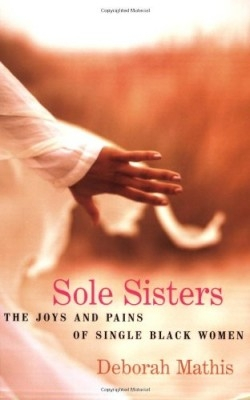Sole Sisters
The Joys and Pains of Single Black Women
The sole sister is often a lonely sister. But being “single does not necessarily mean lonely.” Some women choose to be single, even preferring to parent alone. In fact, culture critics predict that most women over the age of twenty-five, regardless of race or marital status, will find themselves single (or single-again) before they die. There are several factors, including the high rate of black men in prison and the alarming number infected with HIV/AIDS, that suggest that black women’s chances of ever getting married are slimmer than ever.
The author, a journalist and national political commentator, has personal experience with the subject, having been divorced. Curious about the plight of other singles, she interviewed 125 single black women of various ages and socio-economic levels across the country. After providing a brief glimpse into her own life as a single woman, Mathis offers ten descriptors she invented to classify herself and each interviewee. She labels the women and shares excerpts from conversations with them. A few are labeled “Shrinkers,” women who want a companion but refuse to actively search for one; “Swingles,” women who never find it difficult to find a man to date; and “Tickers,” women who are desperate to find a man because they believe they are running out of time. Mathis uses wit and humor to lighten up what could have been a depressing subject: a “freestyler” realizes that “Superman is as rare as kryptonite” and settles for less than the ideal man.
Some of the women lament the “slim pickings,” while others have no trouble finding suitable black men (as well as men of other races) to date, fall in love with, and marry, or at least share a home with. But most of the women have learned to accept that they will probably never get married or be in a committed relationship. These women highlight the perks associated with being single: “No one to report or account to, no logistics to coordinate or schedules to synchronize, no expenses to share or expenditures to explain.”
The conversational tone is comforting and reads like a gossip session amongst sisters, but may be disconcerting for readers looking for statistics, significant quotes from experts, or carefully edited prose. The book also lacks a reference page for those who would like to know more about single women’s issues.
From the disappointment of the influx of “down-low brothers,” to the pain of watching would-be suitors pass by on their way to date women of other races, Mathis tackles the nuances of being single in an honest and sincere manner. After only a few pages, readers soon realize they are not sole sisters after all. There are women who share their frustrations and triumphs all over the country.
Disclosure: This article is not an endorsement, but a review. The publisher of this book provided free copies of the book to have their book reviewed by a professional reviewer. No fee was paid by the publisher for this review. Foreword Reviews only recommends books that we love. Foreword Magazine, Inc. is disclosing this in accordance with the Federal Trade Commission’s 16 CFR, Part 255.

